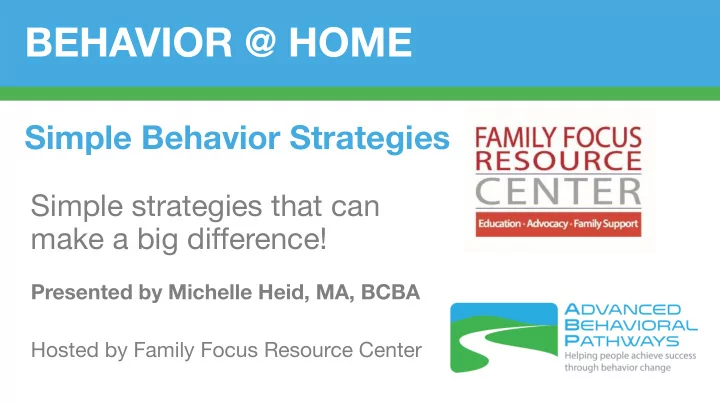

BEHAVIOR @ HOME Simple Behavior Strategies Simple strategies that can make a big difference! Presented by Michelle Heid, MA, BCBA Hosted by Family Focus Resource Center
Simple Behavior Strategies ü Proactive strategies ü Reminders ü Choices ü Timers ü Visual supports ü Rewards, and more ü Advanced Strategies
Proactive Strategies ü Strategies we use before challenging behavior ü May prevent challenging behavior ü Take time and energy before challenging behavior occurs ü May save time in the long run
Encouraging Good Behavior ü Ensure basics needs are met ü Food ü Attention ü Activity ü Medication(s)
Encouraging Good Behavior ü Changes to the environment ü Trigger the behavior you want to see ü Predictability, routine, and consistency ü Clear easy to understand directions
Reminders ü Schedule changes and transitions ü Rewards to be earned and when ü Helps them prepare for what’s next ü Keeps them motivated especially during difficult tasks
Choices ü Provide choices whenever possible ü Types of materials to use for a task ü What activity to do first ü Where to do an activity ü Gives the child a sense of control
Timers Helps kids... ü See how long they have for a task or with a reward ü See how long they have to wait for something ü Set boundaries ü Help kids understand time and expectations ü Prepare them for transitions ü Increases compliance
Visual Supports ü Schedules ü Routines with pictures ü Visual cues (notes/reminders) ü Individual charts
Rewards ü Rewards can help kids follow directions and do difficult tasks ü Letting them know what reward they will earn can keep them motivated ü Use rewards they can only get for following directions or completing a task ü Save certain things to use as rewards
Rewards ü Rewarding good behavior will increase this behavior ü Make sure to use things that are rewarding and this is different for all kids and may depend on their age ü Rewards are not bribes!
Rewards ü Special activities ü Extra time on electronics ü Money or allowance ü Token systems ü Toys or candy
First Then Statements ü Using first then statements helps kids know what to expect and what is next ü ”First math and then 30 min of TV” ü ”First clean your room and then play outside”
First Then Statements ü Work best when a difficult task is followed by a more fun activity ü Also work as reminders of what is on the schedule ü Can be combined with other strategies we have discussed
Frequent Breaks ü Kids may have better behavior when they are given frequent breaks ü Break up tasks and have movement breaks as needed ü Doing any activity too long may cause difficulty maintaining focus or transitioning to something new ü How frequent breaks are depends on your child
Advanced Strategies ü Teaching missing skills ü Communication ü Behavioral Momentum ü Non-contingent reinforcement ü Environmental enrichment
Teaching Missing Skills ü Difficult behavior may occur due to missing skills ü Identify missing skills ü Make a plan to teach ü Takes time to learn new skills ü Some kids are missing skills that others learn easily
Communication ü Many challenges come from difficulty with communication ü Give kids the words they need to meet their needs ü Picture icons they can point to
Behavioral Momentum ü Tasks get easier once you start ü Start with easier tasks first ü Provide help in the beginning ü Make it fun!
Noncontingent Reinforcement ü Provide reinforcement throughout the day ü Attention ü Praise and positive statements ü Fun activities ü Not dependent on earning – just because
Environmental Enrichment ü Structure in the environment may improve behavior ü Create dedicated spaces to do activities ü Create dedicated spaces where things belong ü Make the environment fun and kid friendly
BEHAVIOR @ HOME Thank You!! Behavior Basics May 20 th at 3:00pm Presented by Michelle Heid, MA, BCBA Hosted by Family Focus Resource Center
Recommend
More recommend